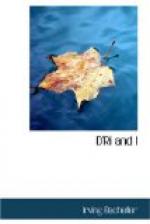“No use talking” said he, in a low tone, as the bow hit the shore, “ain’ no country luk this ‘un, don’ care where ye go.”
As the oars lay still, we could hear in the far timber a call of fife and drum. Listening, we heard the faint familiar strains of “Yankee Doodle.” We came ashore in silence, and I hugged the nearest tree, and was not able to say the “Thank God!” that fell from my lips only half spoken.
XVI
We got our bearings, a pair of boots for D’ri, and a hearty meal in the cabin of a settler. The good man was unfamiliar with the upper shore, and we got no help in our mystery. Starting west, in the woods, on our way to the Harbor, we stopped here and there to listen, but heard only wood-thrush and partridge—the fife and drum of nature. That other music had gone out of hearing. We had no compass, but D’ri knew the forest as a crow knows the air. He knew the language of the trees and the brooks. The feel of the bark and what he called “the lean of the timber” told him which way was south. River and stream had a way of telling him whence they had come and where they were going, but he had no understanding of a map. I remember, after we had come to the Harbor at dusk and told our story, the general asked him to indicate our landing-place and our journey home on a big map at headquarters. D’ri studied the map a brief while. There was a look of embarrassment on his sober face.
“Seems so we come ashore ’bout here,” said he, dropping the middle finger of his right hand in the vicinity of Quebec. “Then we travelled aw-a-a-ay hellwards over ’n this ’ere direction.” With that illuminating remark he had slid his finger over some two hundred leagues of country from Quebec to Michigan.
They met us with honest joy and no little surprise that evening as we came into camp. Ten of our comrades had returned, but as for ourselves, they thought us in for a long stay. We said little of what we had gone through, outside the small office at headquarters, but somehow it began to travel, passing quickly from mouth to mouth, until it got to the newspapers and began to stir the tongue of each raw recruit. General Brown was there that evening, and had for me, as always, the warm heart of a father. He heard our report with a kindly sympathy.
Next morning I rode away to see the Comte de Chaumont at Leraysville. I had my life, and a great reason to be thankful, but there were lives dearer than my own to me, and they were yet in peril. Those dear faces haunted me and filled my sleep with trouble. I rode fast, reaching the chateau at luncheon time. The count was reading in a rustic chair at the big gate. He came running to me, his face red with excitement.




